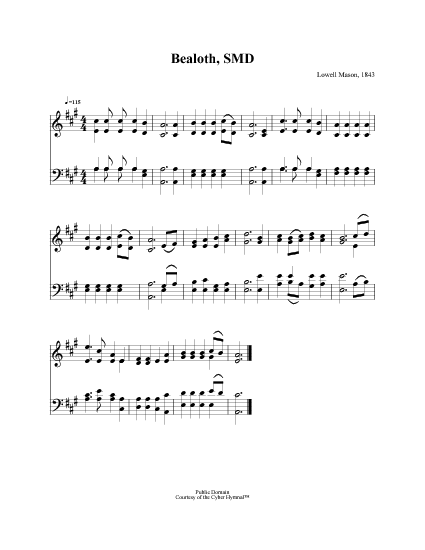- |
User Links
Resurrection of the Saints

And must this body die?
Author: Isaac Watts (1707)Published in 375 hymnals
Printable scores: PDF, Noteworthy ComposerAudio files: MIDI
Representative Text
1 And must this body die,
This mortal frame decay?
And must these active limbs of mine
Lie mouldering in the clay?
2 God, my Redeemer lives,
And ever from the skies
Looks down and watches all my dust,
Till He shall bid it rise.
3 Arrayed in glorious grace
Shall these vile bodies shine,
And every shape, and every face,
Look heavenly and divine.
4 These lively hopes we owe
To Jesus' dying love:
We would adore His grace below
And sing His power above.
5 Dear Lord, accept the praise
Of these our humble songs,
Till tunes of nobler sound we raise
With our immortal tongues.
Source: Evangelical Lutheran Hymn-book #534
Author: Isaac Watts
 Isaac Watts was the son of a schoolmaster, and was born in Southampton, July 17, 1674. He is said to have shown remarkable precocity in childhood, beginning the study of Latin, in his fourth year, and writing respectable verses at the age of seven. At the age of sixteen, he went to London to study in the Academy of the Rev. Thomas Rowe, an Independent minister. In 1698, he became assistant minister of the Independent Church, Berry St., London. In 1702, he became pastor. In 1712, he accepted an invitation to visit Sir Thomas Abney, at his residence of Abney Park, and at Sir Thomas' pressing request, made it his home for the remainder of his life. It was a residence most favourable for his health, and for the prosecution of his literary… Go to person page >
Isaac Watts was the son of a schoolmaster, and was born in Southampton, July 17, 1674. He is said to have shown remarkable precocity in childhood, beginning the study of Latin, in his fourth year, and writing respectable verses at the age of seven. At the age of sixteen, he went to London to study in the Academy of the Rev. Thomas Rowe, an Independent minister. In 1698, he became assistant minister of the Independent Church, Berry St., London. In 1702, he became pastor. In 1712, he accepted an invitation to visit Sir Thomas Abney, at his residence of Abney Park, and at Sir Thomas' pressing request, made it his home for the remainder of his life. It was a residence most favourable for his health, and for the prosecution of his literary… Go to person page >Text Information
| First Line: | And must this body die? |
| Title: | Resurrection of the Saints |
| Author: | Isaac Watts (1707) |
| Meter: | 6.6.8.6 |
| Language: | English |
| Copyright: | Public Domain |
Notes
And must this body die? I. Watts. [Triumph over Death.] First published in his Hymns, &c, 1707, in 6 stanzas of 4 lines and entitled "Triumph over Death in hope of the Resurrection" (Bk. ii, No. cx.). In an altered form it was given by J. Wesley in his Psalms and Hymns published at Charlestown, South Carolina, in 1736-7. It was not included in the Wesleyan Hymn Book in 1780, but added in the Supplement of 1830; "Wesley's text of 1736-7 being retained, with stanza iii., 1.1, "And ever" for "And often" (the original reading of Watts) being omitted. In the revised edition of 1875, this has again been abridged by the omission of the last stanza. The text of the Wesleyan Hymn Book is thus by Watts and J. Wesley. In other collections it is usually Watts unaltered. Its use in America is very extensive.
-- John Julian, Dictionary of Hymnology (1907)
Tune
ST. BRIDESamuel Howard (b. London, England, 1710; d. London, 1782) composed ST. BRIDE as a setting for Psalm 130 in William Riley's London psalter, Parochial Harmony (1762). The melody originally began with "gathering" notes at the beginning of each phrase. The tune's title is a contraction of St. Bridget, t…


 My Starred Hymns
My Starred Hymns





